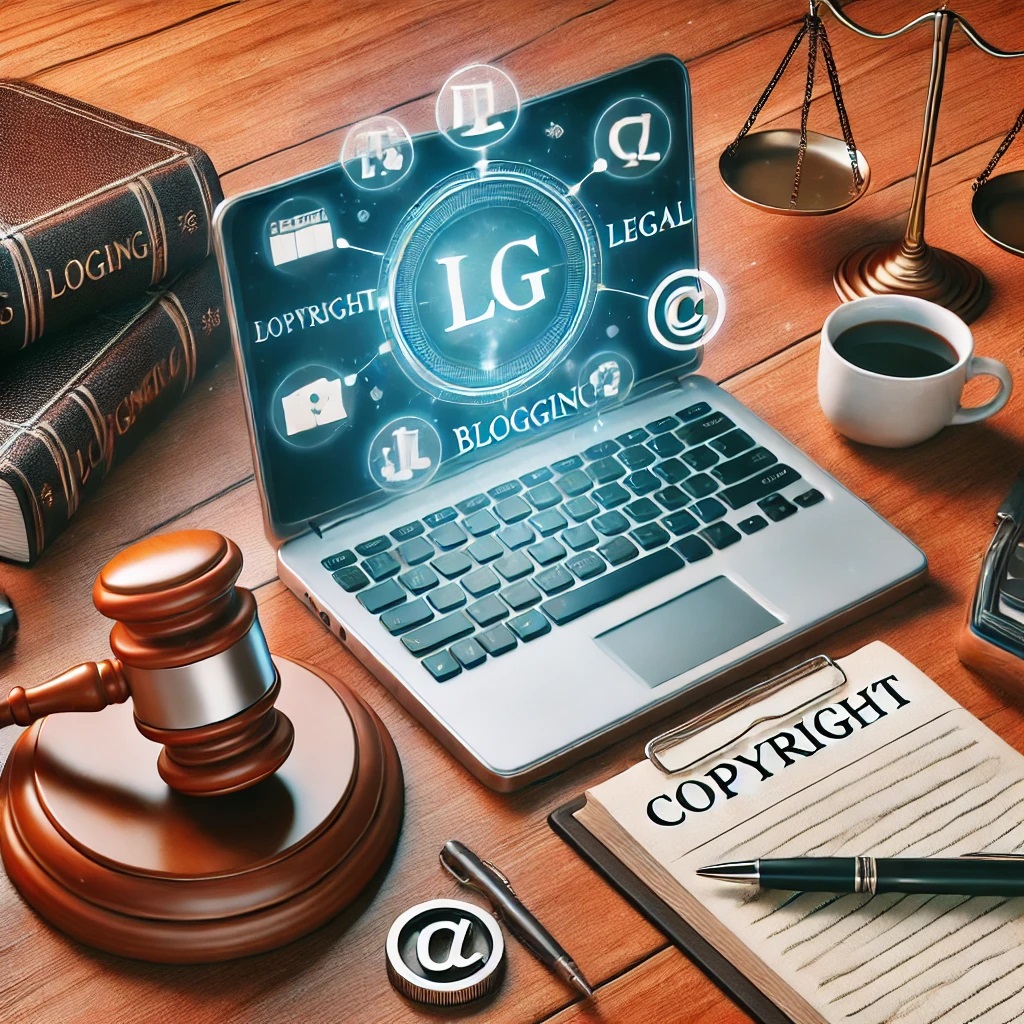How to Avoid Blog Legal Trouble
Do you want to avoid blog legal trouble as best as you can?
Of course, you do. The last thing you want to deal with is a subpoena or a lawsuit threat while you’re trying to grow and monetize your blog. But that can happen, and many bloggers simply ignore this possibility or are dangerously unaware of the legal troubles they could find themselves in the middle of.
I wanted to write this guide to help you avoid legal trouble on your blog and tell you my own story about some legal issues I had to deal with.
Let me start by saying that I am not a lawyer, nor do I have a law degree. This blog post isn’t meant to be legal advice but more education about blog legal issues. Be sure to consult a professional legal expert or lawyer if you need legal assistance or advice.
Now, let’s jump into the guide on how to avoid blog legal trouble so you can focus on blog growth and profit.
Why avoid blog legal trouble?
There are many reasons why you would want to void blog legal trouble.
It’s important for you to be aware of the biggest reasons so that you take it more seriously. For starters, legal issues with blogging can cause you to have to spend a lot of money on legal fees, lawyer services, and even as a result of losing a lawsuit against you. In some cases, legal problems could even result in you being criminal charged and fined or even sent to jail which would be a nightmare that you don’t want to experience.
How I Learned a Hard Lesson About Image Copyright and Blogging
Let me share a personal experience that taught me an important lesson about blogging and legal risks. I hope this helps other bloggers avoid similar mistakes.
Some time ago, a brand reached out to me with an offer to publish a sponsored post on my hiking blog. I accepted the deal, and they provided me with the written content along with several images, assuring me that I could use them. There were no instructions on credits or licensing.
Months later, I received an email from a company called Pixsy, informing me that one of the images in the post was copyrighted and that I owed nearly $1,000 in licensing fees and service charges. I immediately removed the image and explained that I had received it from the sponsor, assuming I had permission to use it. However, Pixsy informed me that I was still responsible for the payment.
After researching the situation, I learned that Pixsy works with photographers to track unauthorized image use and enforce licensing fees. While it was frustrating to be caught in this situation through no fault of my own, the legal responsibility still fell on me as the publisher of the content. In the end, I had to pay nearly $1,000 to resolve the issue.
This experience taught me an important lesson: never use third-party images without personally verifying their copyright status.
What I Do Differently Now:
To avoid any future legal risks:
- I only use images that I personally take with my camera.
- If I need graphics, I create them myself using AI or design software.
- I never accept images from sponsors or third parties unless they provide explicit proof of licensing.
A Word of Caution for Bloggers:
If you accept sponsored posts, always double-check any images provided to you. Services like Pixsy are actively monitoring for copyright violations, and even if you unknowingly use a restricted image like I did, you can still be held liable.
As frustrating as my situation was, I also understand the importance of protecting photographers and creators. My work has been used without permission before, and I know how disheartening it can be. The best way to protect yourself and respect other creators is to always ensure that you have proper rights to any images you use.
By learning from my mistake, I hope other bloggers can avoid similar costly lessons.
Blog Legal Trouble with Property Violations
When you want to avoid blog legal trouble, make sure you really consider the property-type violations that you could find yourself a part of.
Copyrighted Images are one of the biggest, as was the case with my personal story about Pixsy above. Before you use an image, make sure you either obtain a license or search for it to ensure that you can use it. You’d be better off using your own images if you have that option.
Consider trademarks and trade secrets when posting your blog. For example, if you were to post the secret recipe of Kentucky Fried Chicken, they would have the full right to sue you. They would likely win because you have violated their protected trademark. Search for trademarks and patents before posting information that could violate them.
Classified Information is another area to note. If you share classified information on your blog, you can be charged with espionage and even treason. Punishments for these types of crimes often result in significant fines, long prison sentences, and, in some cases, being put to death, pending the charge or country that you’re in.
Be careful with names, whether they’re your customers, competitor agents, or even total strangers. If you share full names and violate privacy, you can be held accountable for it. You should never share someone’s full name without their permission.
The best way to avoid blog legal trouble in most circumstances is to create original content and media. Create posts, strategies, images, and videos yourself, which you can officially call your own. You can’t get in trouble for using your own content unless you are contractually obligated not to or in cases of a court order over prior legal issues.
If you use free photos, video footage, and music files, be sure to thoroughly read and fully understand the license. You might be allowed to use it without crediting the author, but if your use is in a commercial environment, that could change the license, and you could wind up having to pay a lot of money as a result. If you don’t understand the license, you shouldn’t use the content.
If you’re using someone else’s work, avoid blog legal trouble by crediting them when it is required. In some cases, credit may not be enough. This is why you really need to fully understand the license and how it applies to what kind of content you’re using the work on.
The legal issues above are often the most common ones faced in blogging, and they definitely result in bloggers having to pay for them.
Blog Legal Trouble with Blog Content
Sometimes, the content you create can put you into legal issues that you’d rather not be a part of.
Avoid blog legal trouble by having proper policies on your blog when you’re required to have them. For example, every blog should have a privacy policy, and if you use WordPress, there is an easy feature that you can use to make one for your blog. Other policies to consider are disclosures, disclaimers, Terms of Use, and Codes of Conduct.
Make sure that you follow all privacy and data laws that pertain to you and your audience. For example, you might be in the US. Still, your audience is from European countries, so you’d need to follow privacy laws in the US as well as the GDRP for European countries. Individual states may also have additional laws, and child privacy has many that you need to be aware of.
Make sure that your postal address is listed in your marketing emails. It has to be an address where you can receive business mail in order to abide by standards associated with anti-spam measures. If you fail to do this, your emails will likely be automatically sent to spam folders for everyone you send marketing emails to.
Any time you sell content (sponsored post) or link to products you will get paid for (affiliate links), you must identify it. Sponsored posts should be labeled as sponsored posts, and affiliate links should be clearly identified as affiliate links. Some sponsors may try to talk you out of labeling their content, in which case you should end any partnership with them because they’re likely being shady.
Don’t be a fake. Don’t fake reviews, comments, social proof, or anything on your blog because it can be false advertising or misleading representation, and you could be sued for it. The worst part about faking stuff with your blog is you being caught and your reputation being ruined as a result.
If you wish to avoid future blog legal trouble, make sure you really think about what you post on your blog.
Blog Legal Problems Related to Business Laws
You need to be aware of many ways to avoid blog legal trouble when it comes to business laws and licensing.
If you’re making money with your blog, make sure you report it for tax purposes. In the US, the IRS can easily determine if you’re making money based on the tax documents being prepared by those you do business with. If you don’t pay your taxes and you get caught, you could have serious penalties and even face criminal charges.
If you plan to earn a profit with your blog, register it as a business to protect it from liability. Depending on your area, you may have to have a local business license or even register as an LLC or corporation. Doing this will also allow you to write off expenses, which will help you during business tax season.
You want to make sure your blog is compliant with the American Disabilities Act (ADA) if based in the United States. This allows your blog to be easily navigated by people with disabilities. This is more of the right thing to do to make your blog great for everyone to enjoy it.
Make sure you read and understand a contract before you sign it. You should also have others sign contracts when doing business with them on your blog. It’s important to ensure contracts are not broken or violated to avoid blog legal trouble.
Be truthful about your business claims. If you lie, you can be sued and, in some cases, even criminally charged. Don’t ever fake it until you make it because that usually results in complete and utter failure that is hard to get away from.
There are different laws about blogging and profiting from country to country and state to state. It is your responsibility to learn of these laws and follow them. Governments have no obligation to tell you about them first. Make sure you’re doing everything legally and by the book to avoid blog legal trouble.
The idea is to make money with your blog, not spend it all on legal and court fees.
Other Blog Legal Problems
The are a few other things you should do to ensure that you avoid blog legal trouble which I cover below.
Avoid Illegal Activities on your blog to avoid blog legal trouble. If you conduct illegal activities or allow others to do it, you’re the one who will likely be charged with a crime. Blogging should never result in a criminal record, fines, or a prison conviction.
Leibel and defamation are real problems that bloggers face. Be very careful what you say about other people, companies, and organizations on your blog. If you say the wrong thing, they can definitely sue you for it, and it will cost you money whether you win or lose the fight.
Pay attention to third-party terms, privacy, and other policies. Make sure that you are abiding by them when using their service or product on your blog. You should also provide information on how your readers can view third-party terms and policies, which they have a right to know about.
If you are served a lawsuit or are being threatened with one, the best option is to contact a lawyer. In most cases, it may cost around $1,000 or more to get basic legal services, but it will cost more if you don’t. You should also consider business liability insurance, which could provide insurance for the legal costs of your business and blog.
Lastly, make sure you understand the terms and conditions set forth by your hosting service and domain name providers. If you do something that violates their policies, you can be banned from their services. Some hosting and domain providers have stricter rules about how you can use their service than you’re probably used to and it’s important to fully understand those rules.
You can avoid blog legal trouble for the most part by using common sense and making sure you’re aware of what legal issues you can be faced with as a blogger.
Final Thoughts About Blogging Legally
While this article is very informative on how to avoid blog legal trouble, it’s not a complete resource. Make sure you research more on ways to avoid legal issues with your blog. Use the tips above as education for this matter, but again, this is not legal advice, and I am not a legal expert in any way.
Feedback time: Tell me about any legal issues you have faced as a blogger and what you have learned from them.
If you’ve enjoyed this post and would like to support me in providing it for free, please consider making a one-time donation.
Be sure to check out my free newsletter for more blogging tips and resources.
About the Author
Shawn Gossman has created content, blogged, ran online communities, and shared a passion for digital marketing for over twenty years. Shawn believes the best way to help content creators, businesses, brands, and marketers is to give away more than you sell. The same advice is recommended for the readers who follow this blog. Shawn also offers various services for extra help in content creation and blogging.
Grow your online brand with exclusive tips from me sent right to your inbox!



